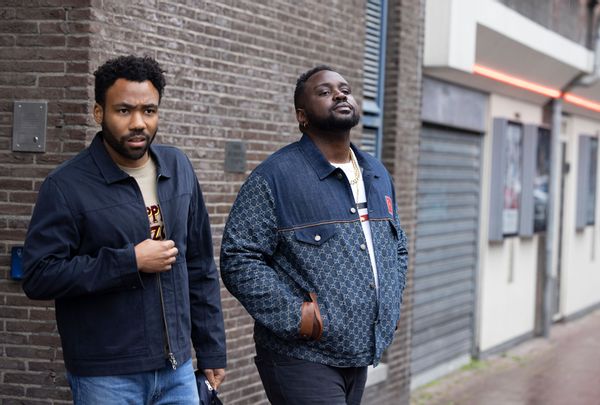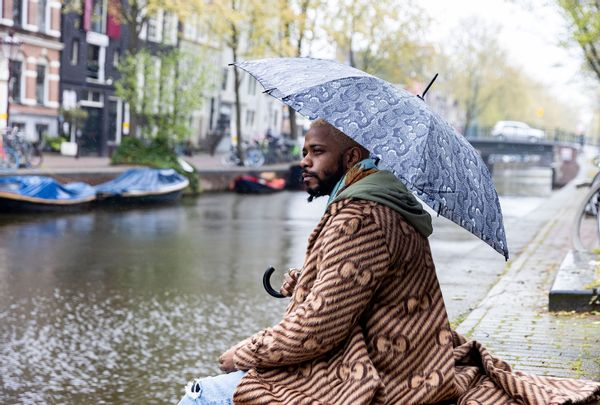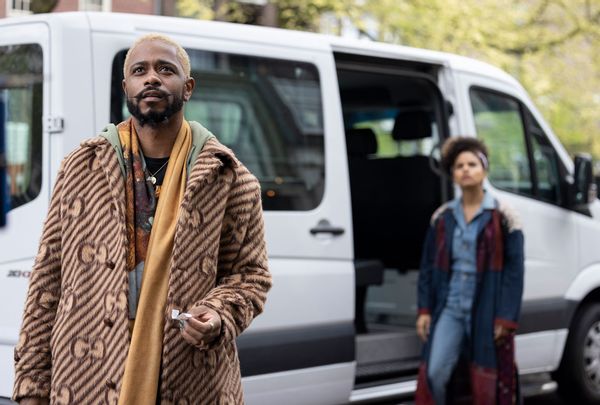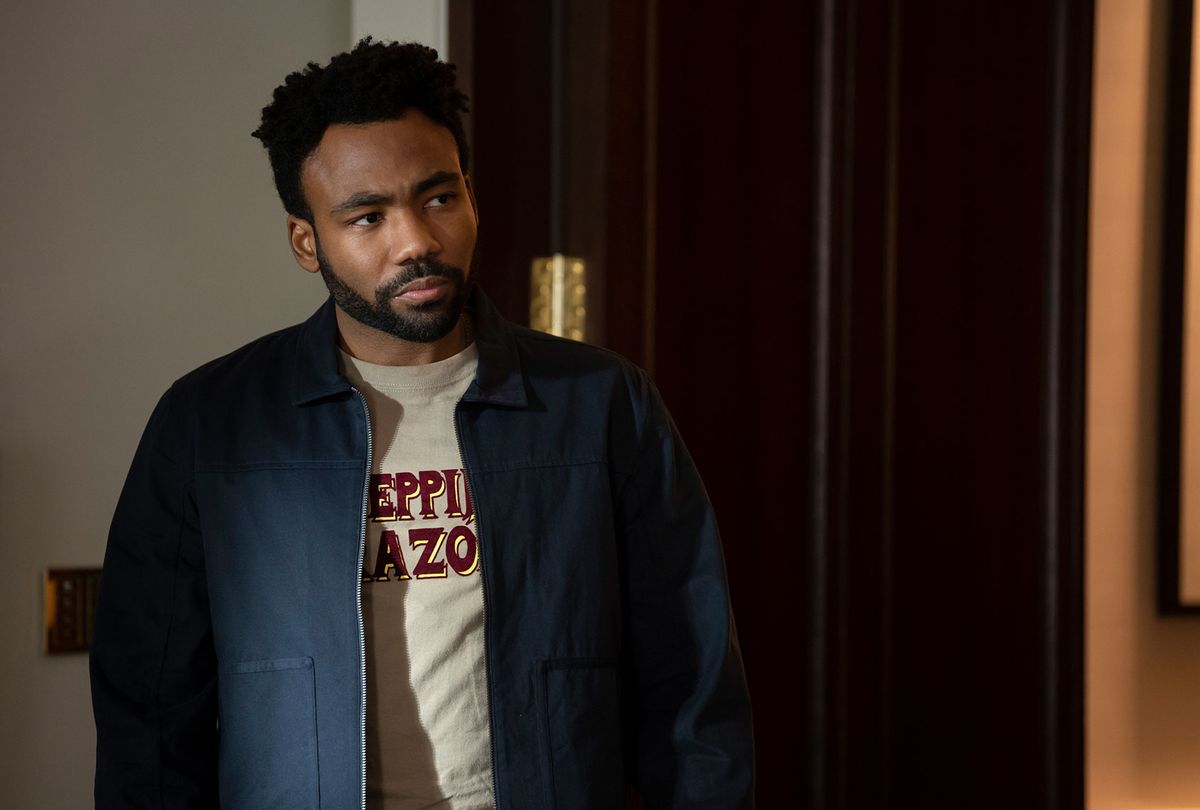For the first Season 3 episode of "Atlanta" – part of a two-episode premiere – we briefly drop into the life of a boy named Laquarius (Christopher Farrar), a class clown whose mother and grandfather are sick of being called in to his principal's office to answer for his disruptions.
The school's well-meaning guidance counselor – a white lady – suggests that Laquarius' class might be too challenging for him. His mother knows differently; he's an idiot, she says, but he's not dumb.
After demanding they simply give her child detention and hauling him in a nearby hallway, the mother disciplines Laquarius in a way Black folks understand to be necessary but, to many white parents, may look like something bordering on abuse. She berates him, forcing him to dance for her like he does to entertain his white classmates.
But what mostly horrifies the guidance counselor is Laquarius' mother warning him, loudly and sternly, "If you don't start using your common sense and acting right, these white people, they're gonna kill you." She leans in and repeats, emphasizing each word, "Kill. You."
True to form, from that point onward the story proves that Mom is telling the truth.
RELATED: Our TV road to "Atlanta" is one long, strange trip into hyperreality
Every season of "Atlanta" opens with a scene from everyday life that transforms, in the space of a breath, into a life-or-death struggle. The latest season launches with a horror movie presented in three parts (hinted at in its title, "Three Slaps"), beginning with two men night fishing, ending in a luxurious Copenhagen hotel room and tagging along with Laquarius' misadventures in between.
Each resembles a European fairy tale – not the Disneyfied versions, but the original stories where children are eaten and little mermaids dissolve into foam.
Here, the fable and boogeyman are one in the same: whiteness. Laquarius falls victim to the variety wielded by white women, starting with the guidance counselor who speaks over the Black principal and is ready to write off this little boy as stupid. Later, a pair of weaponized, granola-liberal Karens played by Laura Dreyfuss and Jamie Neumann ("Lovecraft Country") torment him with terrible cooking and, ahem, forced gardening.
Before this, in the premiere's first section, the white man tells his Black friend that the lake they're floating on covers a town. It used to be populated by free Black folks who came "too close" to being white, so the local government flooded it, he explains.
That sounds made up, right? But that story is at least based on one of many true ones. The pair could be fishing Georgia's Lake Lanier, created by the government's flooding of Oscarville, a Black town wiped off the map first by racist violence and then by water.
"With enough blood and money, anyone can be white. It's always been that way," the white guy (Tobias Segal) tells his Black fishing partner (Tyrell Munn). "The thing about being white is, it blinds you. It's easy to see the Black man as cursed because you've separated yourself from him. But you don't know you're enslaved, just like him. Cold whiteness. You're hypothermic. You lose logic."
Maybe you come to believe that everyone has a fair shot at Happily Ever After.
More than four years have passed between the second and third seasons of "Atlanta," but life for Black folks hasn't changed enough for its plot to depart from Donald Glover's original thesis. "I always want people to be scared, because that's how it kind of feels to be Black," the show's creator declared before the first season premiered.
 Atlanta (Coco Olakunle/FX)Every new round pushes that concept a little farther, injecting more surrealism but never enough to entirely depart from reality – as Black folks live it, I should clarify. Anyone else may determine that "Atlanta" is purely absurdist, which also means the show is creatively succeeding.
Atlanta (Coco Olakunle/FX)Every new round pushes that concept a little farther, injecting more surrealism but never enough to entirely depart from reality – as Black folks live it, I should clarify. Anyone else may determine that "Atlanta" is purely absurdist, which also means the show is creatively succeeding.
"Atlanta" gorgeously merges comedy and art like few other shows on TV, a feat realized through Hiro Murai's gauzy directing style and a shrewd writing team that delivers knowing winks to the subset of viewers who have lived the script's punchlines. Together, they make this a comedy for folks who fall out laughing ahead of the next scene's joke, because they have a good sense of what's about to happen.
But it also carries enough "prestige" about it to win over people who would never deign to physically set foot in the places where Earn (Glover), Alfred (Brian Tyree Henry), Darius (LaKeith Stanfield) and Van (Zazie Beetz) live and spend their time.
These are the folks, I suspect, who will be concurrently wowed and made uncomfortable by this new season.
Most of the action takes place in Europe, the birthplace of whiteness.
A show devoted to exploring the sensation of Blackness must eventually examine that concept within such a context. This also make its latest excursions less of a window into Earn, Van, Alfred and Darius' lives than a mirror reflecting the white gaze back on itself, like some endless portal created by placing one looking glass across from another.
Granted, the four of them are still specific guides in journeys that feel universal. Their familial relationship remains the show's best asset; their bonds may be tested but have managed to withstand all kinds of trials. Earn is still messy, enabling Alfred to play the part of a star whose demands have gotten ever more ludicrous; at one point he orders Earn to procure him an unspeakable amount of fried chicken. "All legs," he specifies.
 Atlanta (Coco Olakunle/FX)Darius, ever the philosopher king, contentedly drifts along in life's stream, curious to witness and explore the strange happenings on society's outskirts. The second episode finds Van in a mood to drift too, leading to an adventure that lampoons white culture's practice of co-opting brown spirituality that abruptly ends with a morbid, slapstick moment that rivals the best Monty Python sketches.
Atlanta (Coco Olakunle/FX)Darius, ever the philosopher king, contentedly drifts along in life's stream, curious to witness and explore the strange happenings on society's outskirts. The second episode finds Van in a mood to drift too, leading to an adventure that lampoons white culture's practice of co-opting brown spirituality that abruptly ends with a morbid, slapstick moment that rivals the best Monty Python sketches.
But their adventures do prove the lie of that fisherman's declaration about money buying whiteness. Maybe for Jay-Z, but Paper Boi's music has merely granted Alfred, Earn and the rest "big in Belgium" status – or, rather, Amsterdam. The Dutch cannabis mecca inserts "Atlanta" into a place and culture that's very white and has a reputation for being friendly and welcoming, which it lives up to in some ways and fails in others.
"I've been roaming the streets. High since twilight. This city is my Jesus," Darius serenely declares as he sits by a canal.
But he misses Holland's holiday tradition revolving around a character called Zwarte Piet, or Black Pete, Santa's so-called "helper" who gives its white citizens an excuse to cavort about in blackface. "It's for the children. It's a long tradition, passed down for many generations," Earn and Alfred's driver cheerily explains. "Actually, he's black because he fell down the chimney. Helping, uh, Saint Nicholas."
"I respect the rebrand," Earn deadpans. The man, unaffected, simply smiles.
Want a daily wrap-up of all the news and commentary Salon has to offer? Subscribe to our morning newsletter, Crash Course.
Shows often indulge in special vacation episodes, but the way "Atlanta" uses its trip abroad is refreshingly unique, which isn't surprising.
The show traveled past the point of cementing its assured artistry in its second season. When it announces it is upping the ante, we can trust it knows what it's doing. These two episodes back up this assumption, both through the premiere's side trip from the main storyline and the gang's travels into an unknown place where they're considered as both foreign and other.
 Atlanta (Coco Olakunle/FX)Looking closely at the smaller production details reveals an extra level of brilliance at work. Glover's brother and fellow executive producer Stephen Glover wrote "Three Slaps," and that speech the white guy delivers about whiteness, and the sunken, forgotten town. Both are utterly true, but might seem even less believable if the dialogue were placed in the mouth of the Black man.
Atlanta (Coco Olakunle/FX)Looking closely at the smaller production details reveals an extra level of brilliance at work. Glover's brother and fellow executive producer Stephen Glover wrote "Three Slaps," and that speech the white guy delivers about whiteness, and the sunken, forgotten town. Both are utterly true, but might seem even less believable if the dialogue were placed in the mouth of the Black man.
Stephen Glover has plenty to say about that too via Laquarius' odyssey, starting with his teacher's risible announcement that, in observance of Black History Month, students would be taken to see a movie – about an entirely fictional superhuman. Putting all of this together with the Black Pete bit, used as a commentary on tradition and, eventually, a sight gag that gives Earn the upper hand for once, the show becomes a gift-wrapped palliative to present circumstances so many foolishly believed we'd never see.
At a time when the right-wing political apparatus is devoted to erasing Black and non-white history to protect whiteness, and in a week when its leadership is doing everything it can to smear the first Black woman nominated to serve on the U.S. Supreme Court, the show's return is perfected timed.
For all of the truth it spits, "Atlanta" still reigns as one of TV's smartest and more relieving comedies because its honesty travels well. "White is where you are, is when you are," the man in the boat says. Regardless of the year, this show keeps on proving how true that is, beyond a drop of doubt.
The third season of "Atlanta" premieres with two episodes airing back-to-back starting at 10 p.m. Thursday, March 24, on FX and streaming on Hulu. Watch a trailer for it below, via YouTube.
More stories like this:
- "Atlanta" shows how to co-opt Juneteenth
- Don't blame cancel culture for boring TV
- "This Is America": Is Glover a genius?
- "Lion King" and the nostalgia upgrade



Shares